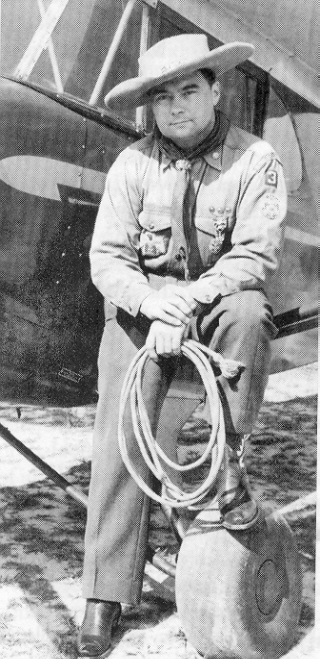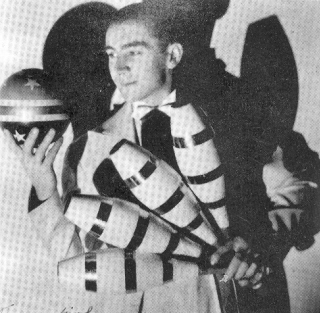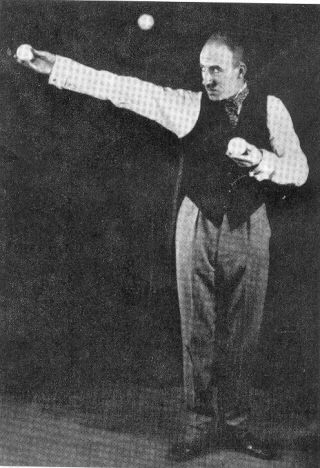|
Jugglers
followed a certain rigid professional code then unheard of its the
current world where the performer strives to break through the
"fourth wall" to interact with the audience. Jennings
explained, "The rules of juggling were stricter then. I didn't put
anything in my act until I could do it 300 times without missing. We
used to count how many shows in a row we'd go without a miss we couldn't
cover. And when agents specified times for an act, they didn't want 10
seconds more or less."
Props
were a rare commodity, too. Club manufacturer Harry Lind wouldn't make
clubs for just anyone, customers had to be referred by performers he
knew and trusted. Likewise, the source for purchase of lacrosse balls
was a closely guarded secret because there was just one place in the US
that made them - the Bacrac Raisin Company in Baltimore!
Jennings
recognized performing as a quick way out of the Depression, and worked
hard at it. His philosophy was that "there are eight letters in
business and just four in show," so he spent twice as much time on
business as his act. One afternoon a month he made the rounds to visit
every agent in town. He carried calendars printed with his name and
phone number that fit in their desk blotters, and sent them all
Christmas cards. "If you were willing to go for it there was a lot
of work," he said.
Like
his close friend Stan Kavanaugh, who always dressed like a rich banker,
Jennings carefully cultivated an image of success as a promote his
business. "I was playing the game then," he said.
By
1936 he was doing well as an entertainer, and bought a new frosty green
Chevy for $600. "It was an expensive car," he said. Admission
to the vaudeville shows was a quarter for for as long as you wanted to
stay, and you could get a full meal at a restaurant for 50 cents.
All
the while he was learning to be an entertainer, he was courting a young
woman named Ruth. Their courtship extended to almost seven years because
Art was supporting his own family during the depression and didn't feel
like he could afford to take on a wife as well. Finally they were
married in 1938, and eventually had two children. Arthur Jr. was born in
1944 and Linda was born three years later.
When
World War II broke out, Jennings tried to enlist, but was too old.
Instead, the War Manpower Agency drafted him in 1941 into industry and
assigned him to the Elliott Turbo Machinery Company. He didn't know it
at the time, but his engineering skills were being used as part of
America's Manhattan Project, the quest to create the atomic bomb.
The
work was in Pittsburgh, and occupied him for about 70 hours a week. But
Jennings was tremendously energetic, and needed just three to four hours
sleep a night. That left him almost 70 hours per week free for
performing, and the work was plentiful!
"A
good act could work anywhere from six to eight months in a single major
city," he said. "There were 27 agents booking acts in
Pittsburgh alone. There were several levels of agents, some who booked
you in the top places, and others who just did club dates. They went all
the way down to those that booked stag shows. But at the time a stag
show gal ended her act wearing enough clothing to be respectable in a
shopping mall today! There wasn't any real nudity, just the suggestion
of it!"
Pittsburgh
had four or five major vaudeville theatres, and there were theatres in
surrounding suburban cities, too. All the fraternal organizations, such
as the Eagles, Elk and Moose which had shows, too. Radio was the only
thing that might keep people in the house at that time. The people who
had enough money went out some place every night.
At
places like the Barbizon Plaza in New York City, the audience wore
evening clothes to watch the juggling and other acts, and no one would
dare stand to leave the room while an act was in progress.
There
were also burlesque theatres, which offered a different type of
entertainment - though it had very little to do with the nudity
associated with the word today. Jennings said, "Burlesque meant
'making fun of.' When I was a kid my mother would take us to the
burlesque show because it featured acts by characters from the newspaper
funny papers."
There
were also five or six amusement parks within a 50 mile radius of
Pittsburgh, and each hired two acts for contracts of a week or two.
"There would be a high circus act and a stage act, and you'd do two
shows a day," Jennings said. "The high act, which could be
seen from a long way away, would go on about 1 p.m. to bring the people
out of the picnic area and into the park where the rides were The low
act, which was me, would entertain them once they got
inside."
There
were also almost 10 night clubs in Pittsburgh up until about 1950, each
of which featured two shows a night. During the war, there were also USO
shows that didn't pay much, but provided steady work and were considered
patriotic duty.
There
was also significant "corporate" work at that time. Jennings
worked for National Distillers in 1937-38, performing a magic and
juggling act that involved their spirits. He also worked for Nationwide
Insurance, and did a variety act sponsored by Pittsburgh radio station
KDKA.
The
colorful and vibrant world of entertainment also included mystery and
danger. Jennings recalls a night club in nearby Wampum, Penn., that
"wasn't the type of place you'd choose to work." The stage
wobbled, and the clientele was shady looking. "It was run by the
Mafia," Jennings said. "You didn't dare refuse to work there
if you wanted to keep working!" |


